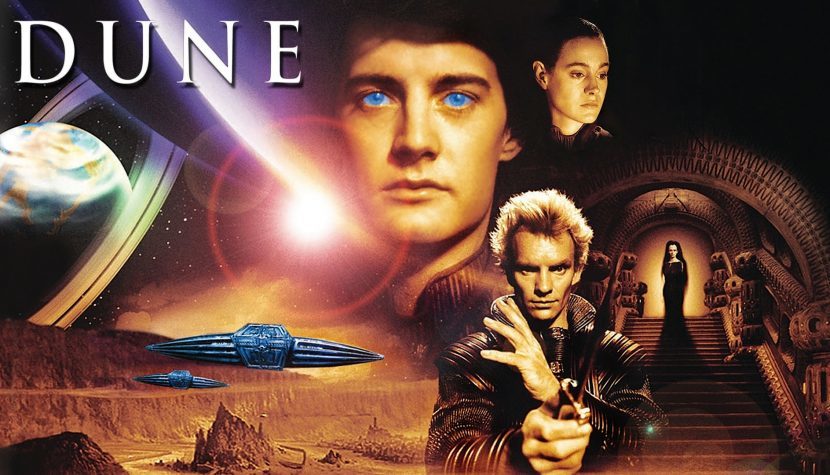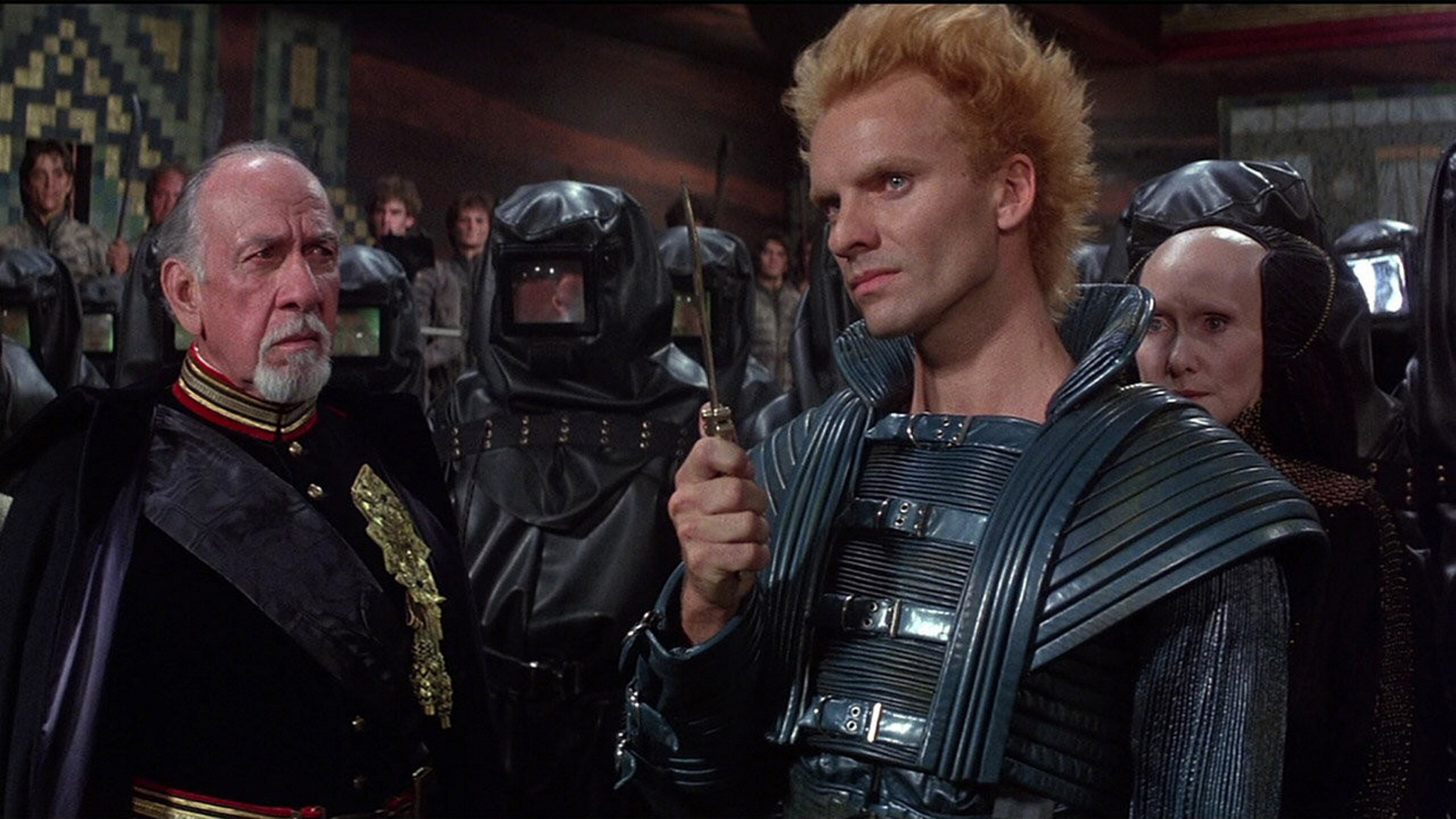David Lynch’s DUNE. Science fiction without a soul

By adapting Frank Herbert’s sensational novel, Lynch could predict that he would offend fans of this work. So it happened. The film turned out to be only a summary of the book, but as if that wasn’t enough, the director changed many plotlines. Indeed, when looking at this picture, it is sometimes hard not to compare it with the literary prototype, and yet I believe that to a large extent Lynch has created something that lives its own life. Something that can fascinate, draw you in and surround you with a stuffy, desert climate, but something that you can’t love.
You must know that the current year is 10192, the entire known universe is ruled by the Padishah Emperor Shaddam IV, my father. The most valuable raw material in the universe is a spice called Melange. Spice prolongs life, spice expands consciousness, spice is the key to interstellar travel. (…) The spice is found only on one planet of the entire universe. A desert, dry planet, where people called Fremen live in caves, in a wasteland of rocks. For centuries, they have believed in the prophecy that the chosen one will appear. The Messiah who will lead them to true freedom. This planet is Arrakis, also known as Dune…
Related:
No rapacity

What is surprising is the conservatism of the author of the screen adaptation. Knowing the style of the creator of Lost Highway, it is hard to expect a work that is not very dynamic in comparison to the novel. The book, imbued with visions, mystical omniscience, so tangibly allowing you to travel to the past in the present, seemed perfect for Lynch, who enjoys nightmares, so wonderfully inscribing them into reality. Here, however, he completely missed the easy opportunities that opened up to him. The visions are very economical, even ascetic in their form. Where the writer with a steady hand drew a world into which the reader could penetrate, tangibly feel it, and for those moments here and now a desert planet descended, the possibilities offered by the spice opened up, then in Lynch’s world the viewer is only an observer. He does not participate in conspiracies, feelings, does not penetrate the thoughts of the characters, he is only a witness to their actions. He can only admire the fantastic setting, the effects at a much higher level than in the new adaptation of the Arrakis saga, as well as the great acting of the actors. What is missing is emotions. Despite this, I consider Lynch’s Dune a successful film, but watching this work, each time I have the impression that the author was afraid of the material he held in his hands. There is no rapacity in this film, no force, in no way profanes the brilliant first volume of the saga, it is only an inaccurate summary of the novel. And this is the main, as well as perhaps the only objection to this story. Lynch was not up to the challenge. It doesn’t matter anymore that he had to cut up his film, remove a lot. Of course, it is impossible to fully understand the motivation of the characters without knowing the literary prototype. However, the form of the work is something else. The splendid setting conceals this great conservatism. Therefore, it is not Herbert’s fans who have the right to rightly feel sorry for the director, but Lynch’s style lovers, from which the artist has largely abandoned at this point…
Too many signals

At the very beginning, however, I called this film an autonomous creation. It sounds strange, considering that without knowing the book we do not have a full picture of that world, we do not fully understand the behavior of the characters. Yes. However, autonomy lies in the fact that we do not need this knowledge at all. With only the film at our disposal, we admire the other world and clearly defined characters. The author divided the characters in a rather schematic way, taking black and white as determinants. For example, the Baron is not only repulsive by his actions, but also visually, by his disgusting appearance. The case is similar with Feyd – arrogant, beautiful, about whom we can form an opinion after the first visual contact with this personality. The most interesting character is Paul. He looks really great, and despite the pleiad of celebrities surrounding him, MacLachlan probably did the best with the task entrusted to him. It is a pity that Lynch did not decide to focus entirely on this hero, then he could more clearly illustrate the mechanism of power, the cult of personality and the threats that result from the fact of taking the “job” of the Messiah. It’s all signaled, but too much has been tried to signal instead of digging into one of the elements. The finale is interesting, giving the story an optimistic dimension, assuming that the dream can actually come true and it is a dream about the greatest desire of those people. If the interpretation is based on the literary prototype, the conclusions drawn from the original ending sound quite different.
There is no shortage of advantages

Lynch failed to convey the magic of the book, he failed to depict the beauty and danger of the planet, which completely changes the perception of reality. He created a work pleasing to the eye, which may be of interest, but in fact leaves Herbert’s admirers indifferent. That’s not what the novel was about. It seems that if you face such a cult work, you should do it like Jackson with the equivalent of Dune in the fantasy world, i.e. the Lord of the Rings series. Because these works cannot be drained from one thing – emotions and a clear message. And while there were many messages in Dune, as long as it was a story of both love and getting lost in what they were trying to escape from … so in Lynch there is little of it. There is only nice packaging, which is a poor summary of some of the threads. Anyway, I like this movie. I like it because it allows for another contact with the alluring and dangerous beauty. It also has another huge advantage – a great musical setting. Unfortunately, it didn’t live up to fans’ dreams, and it probably didn’t live up to sci-fi lovers’ dreams either. He limited himself to fulfilling the dream of the people of Arrakis, and in a very perverse way.
However, applause is due for the courage and the fact that Lynch’s confrontation with this work does not leave a bad taste. It’s hard for me to really criticize anything. Maybe it’s just that despite the sensational acting and visual setting … the lack of this story of the soul.





